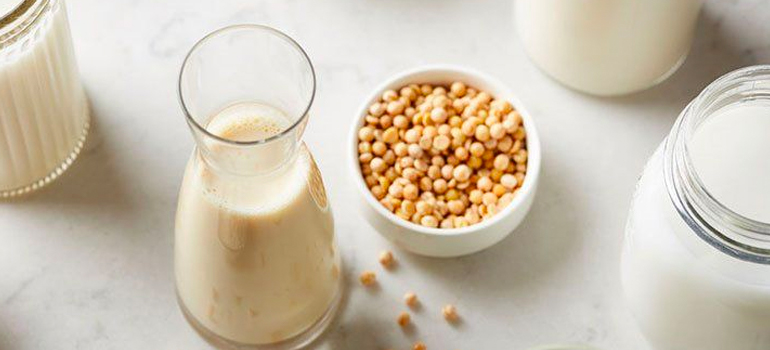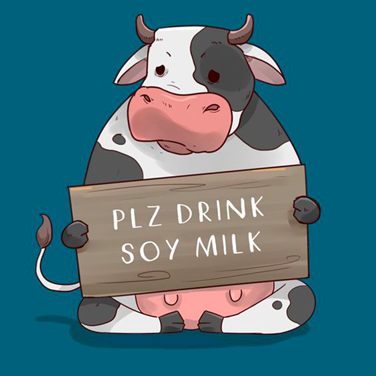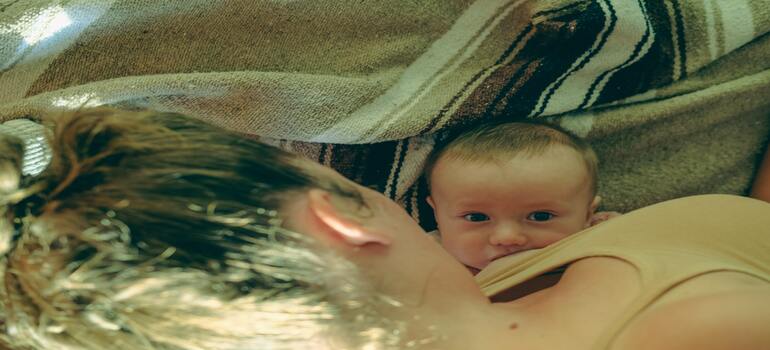Is soy milk the right choice for your baby?

- October 14, 2020
- MKB Team
Is Soy Milk The Right Choice For Your Baby?
Food fads are exhausting to keep up with. Our generation grew up being overdosed on cow’s milk and now what do we hear? Dairy isn’t your best friend? You can be lactose intolerant? WHAT? We never thought this day would come. But the truth of the matter is, with changing times and ever-evolving science, we are coming across so many new theories. Most of them do make sense if we get into the details. It is said that soy milk drink was originally introduced by Mahatma Gandhi in 1935. Where were we living all these years? Under a rock?
Nowadays, it is slowly becoming popular in India and is available in most of the supermarkets. In western countries, soymilk is a popular alternative to cow’s milk with a roughly similar protein and fat content and is suitable for people with lactose, milk protein, or gluten intolerance.
How is soy milk made?
Soy milk is made from cooked soybeans and contains soy protein, natural or added sugars, and fibre. While the nutritional content can vary from brand to brand, a 4-ounce glass of soy milk contains about 40 calories, 3 to 4 grams of protein, and 2 grams of fat and a half-gram of sugar. It also contains minerals like calcium, iron and potassium.
It's a good source of protein, vitamin A, vitamin B-12, potassium, and isoflavones, plus it can be fortified with calcium and vitamin D. It contains as much protein as cow's milk, yet is lower in calories than whole milk and about equal to the calories in 1 per cent or 2 per cent milk.
How is the taste and texture of Soy milk?
Soy milk typically doesn't have as sweet a flavour as almond milk but tends to have a creamier consistency, making it a good coffee creamer. Soy milk will provide more B vitamins like folate, more magnesium and potassium as compared to almond milk, and has slightly less sodium.
Soy is a good source of low-fat and plant-based protein. It is cholesterol-free, has less saturated fat than cow's milk and lowers the LDL in the body. Cow's milk, on the other hand, has more calcium than natural soy. Both calcium-fortified soy milk and low-fat milk are good sources of protein and calcium.
Should babies drink soy milk?
Babies under the age of 1 shouldn’t drink cow's milk, soy milk or any other plant-based milks, and stick to only breast milk or formula (with a little water after they start solids). Cow’s milk contains too many proteins and minerals for babies’ stomachs to handle, and most plant-based milks aren’t adequate sources of the many nutrients babies need early on.
In moderation (1 to 2 cups a day) soy milk is a good alternative for children over a year old who either prefer soy milk or are lactose intolerant or allergic to cow's milk. However, some children are allergic to the protein in soy. Although most children eventually outgrow a soy allergy, it may persist into adulthood.
Between the ages of 1 and 5, doctors recommend that children drink mainly cow's milk and water. However, fortified soy milk is an acceptable alternative to cow's milk, since it's nutritionally equivalent. So if your child does drink soy milk before the age of 5 and after age 1, make sure it's fortified and unsweetened.

Alternatively, you can work with your paediatrician to determine the best kind of soy milk for your child. Not only can the nutritional content of soy milk vary by brand, but experts also point out that our bodies may not be able to absorb nutrients from plant-milks as well as they can from dairy milk, so be sure that the kind you're choosing is one recommended by your doctor.
Soy milk vs. cow's milk for babies
Other than certain fortified soy milks, experts point out that cow’s milk contains more nutrients, cup for cup, than plant-based milk. For example, 1 cup of whole milk contains 149 calories, and about 7 to 8 grams of protein compared to the 105 calories and 6 grams of protein in soy milk. Whole milk contains more fat and sugar, too. One cup of cow’s milk contains 8 grams of fat and 12 grams of sugar; one cup of soy milk contains about 3.5 grams of fat and 9 grams of sugar.
As for vitamins and minerals, 1 cup of whole milk contains 276 milligrams of calcium and 322 milligrams of potassium, whereas the same amount of soy milk contains 300 milligrams of calcium and 298 milligrams of potassium.

Published by
MKB Team
200 Articles
MomsKnowBest is a fast-growing vibrant community of moms, for moms, by moms. Motherhood is complex fun, fulfilling, grueling, exhausting and very complex. There’s no handbook to it. And let’s face it – moms are put...
Read MoreShare with your friends!
Leave a Comment
Trending Post
Myth Buster: Having iron tablets makes your child...
Busting Top 10 Pregnancy Myths about having Iron Tablets
One of the Top 10 pregnancy myths is that...
Health Benefits of Pomelo For Moms To-Be & Kids
During pregnancy, women need proper nutrition to support their health as well as the growth of the...



